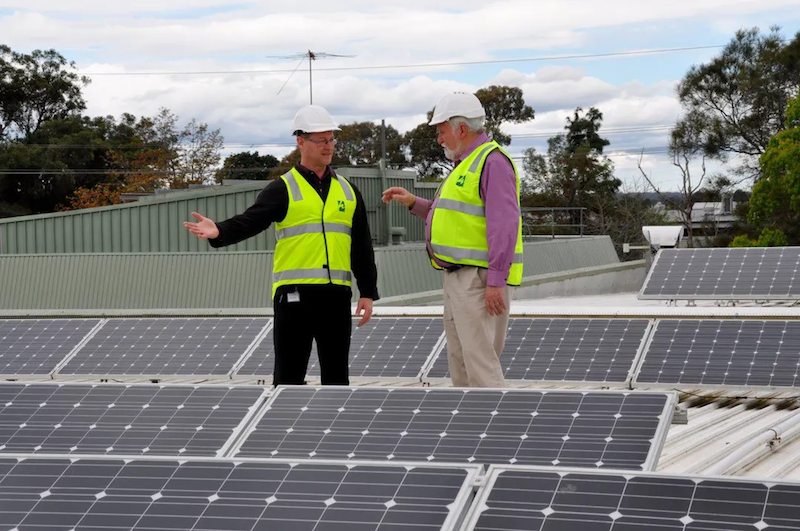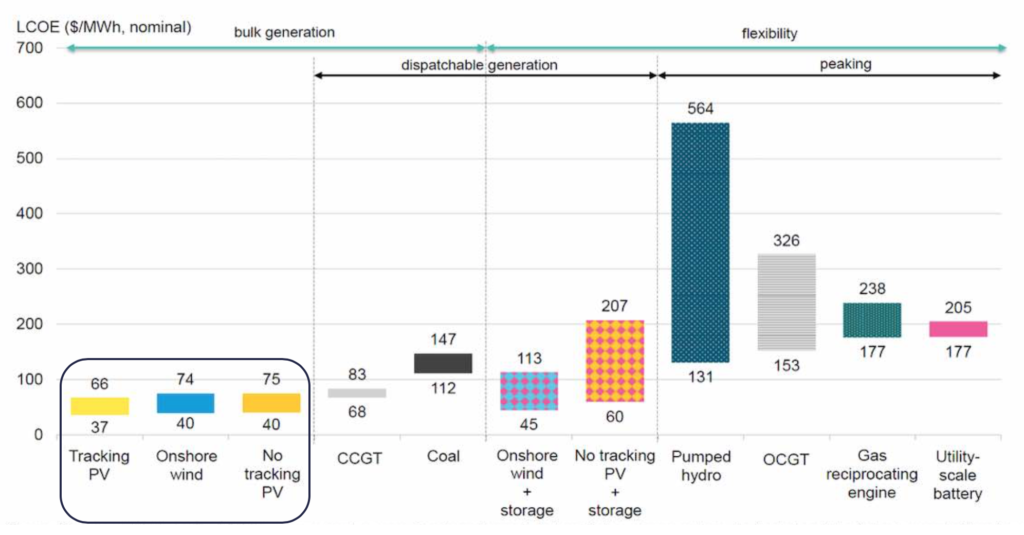In May 2020, Hawkesbury City Council announced signing a new electricity supply agreement, taking a huge step towards 100 per cent renewable power.
The 10-year Power Purchase Agreement (PPA) is the result of Council’s commitment to achieve both carbon emissions reductions and cost savings for council.
Hawkesbury City Council, located in New South Wales, became a member of the Cities Power Partnership in July 2017. Since that time, Council has implemented a wide range of initiatives to reduce emissions and save costs on electricity, including developing and expanding its Solar Program (installing 750kW of solar) and it’s LED Street Lighting program (upgrading 1,000 streetlights) to reduce energy including LEDs across buildings, AC replacements, LED sporting oval lighting projects, pool filter systems retrofits, evacuated tube refits for water heating, and many more similar projects.
In combination with these initiatives, Council’s new electricity supply agreement will deliver a 100 per cent reduction in total carbon emission for council’s large facilities and street lighting combined, and a 47 per cent reduction in carbon emission overall.
According to Hawkesbury Council, the agreement will save $2.5 million over 10 years, and reduce Councils’ emissions by 67,000 tonnes. Mayor Calvert said:
We always knew that renewable energy is the power of the future, and now the future is here.
To meet its goals, Hawkesbury City Council recently engaged Renewable Energy Hub to manage a competitive PPA tender process, ultimately procuring via a retail PPA in just under 6 weeks.
Renewable Energy Hub undertook scenario analysis, compared non-renewable and renewable options to demonstrate value and promote competitive tension via a single-stage RFP process, to support Hawkesbury Council in its procurement process to meet its ambitious goals.
This achievement highlights some important learnings about PPAs in the current market that can provide an option for other Councils to use and provides an example by which some common questions about PPAs can be answered in the context of the current market below.
What exactly is a Power Purchase Agreement?
A power purchase agreement (PPA) is a contractual agreement between energy buyers (councils or corporates) and sellers (energy retailers and/or project developers). It’s an agreement to buy and sell an amount of energy which is or will be generated by a renewable asset at an agreed price and for a fixed term.
Key benefits of PPAs are that they allow you to achieve the following, without the need for upfront capital, development expertise or land availability:
- Reduce carbon emissions and associated potential carbon liabilities.
- Manage long-term energy costs and reduce exposure to wholesale price volatility.
- Support your council’s commitments and goals for sustainability.
A PPA is usually signed for a longer-term period than a standard electricity agreement, generally between 5-15 years, with better prices for longer terms. This is because renewable energy projects need the security provided by the PPA to obtain finance to construct the project.
There are multiple types of PPAs, each with a different risk-reward profile. Three key groups generally described in the market include:
- Retail PPA – This replaces your current electricity contract and is managed by a retailer. It can be fully firmed, partially firmed or spot price exposed. This is the most similar type to your current electricity agreement.
- Retailer-sleeved PPA – where a retailer sleeves your wholesale PPA with balance of supply via progressive purchasing or a fixed price.
- Wholesale PPA – an agreement made directly with a project developer (i.e. the company building the wind or solar farm). This is a financial contract (also known as a virtual PPA or a contract-for-difference) that sits alongside your standard electricity agreement. This PPA requires separate firming solutions to meet your demand profile and involves greater risk-reward.
In the first two types, the retailer bears the burden of price volatility, supply and firming complexity associated with meeting your demand profile.
Retail PPAs have emerged as a popular choice, especially among local governments but corporates too due to the risk allocation to the retailer and similarity to standard retail contracts. This growing popularity is being supported by more offerings from more retailers in the market, growing from just one or two 2 years ago to 10 or more today.
Hawkesbury City Council’s PPA is an example of a Retail PPA – a 10-year PPA partially firmed (completely fixed for first five years, fixed + firming mechanism years five-ten). In advising Hawkesbury, Renewable Energy Hub’s Lead Consultant Trent Gauci reviewed options for five-year and seven-year contract length to seek the most attractive outcome.

How long does it take to procure a PPA?
We have seen some PPAs take 6 to 12 months to complete, and even longer for some of the early aggregation projects. This generally applies to the wholesale/virtual PPA type and is often due to the novel nature of this type of PPA contract compared with standard supply agreements. This can be discouraging for councils seeking a simple outcome without a long lead time.
In the case of Hawkesbury Council’s retail PPA, from engagement to completion was just under 6 weeks. This timeframe was achievable due to prior internal stakeholder engagement and education on PPA-related topics to make sure all key council functions were across the key details.
What size electricity load do I need?
Retail PPAs are now an option for small loads down to 1 GWhr p.a. (and possibly lower). Load sizes of less than 10 GWhr p.a. are common, such as for Hawkesbury City Council, generally covering large sites and street lighting.
Why can’t I just ask my electricity retailer to source 100% electricity for me without a PPA?
One day, this should be easy. But for now, the simplest answer is cost. Asking your electricity retailer to keep you on a standard supply agreement, which may be just a 1 to 3-year term, for 100% renewables, will result in an extremely high cost – if they are willing to do it at all. This is because the retailer will need to commit to purchasing renewable energy to meet your demand profile via a similar agreement with multiple projects – and those agreements need to be longer term. Where there is a long-term agreement in place on the buyer side (via PPA), this becomes possible. Given renewable electricity is cheaper to generate, paying more seems counterintuitive.
Why pursue a PPA in the current market?
Energy markets have declined in 2020, resulting in lower prices for black energy, so on face-value, it can be difficult to build the business case for renewable energy procurement. However, there are multiple reasons why procuring renewables now represents a strategic move:
PPAs can help your council achieve its sustainability commitments and goals.
Renewable energy, risk-management and industry leadership goals all remain relevant and compelling despite recent market changes. Renewable energy PPAs provide some of the fastest and most effective ways to meet these commitments and goals.
Renewable energy PPAs provide a risk management strategy for energy price volatility as the market transitions to a low carbon future.
Historically, electricity price volatility has been driven by events such as drought (2007), carbon prices (2013), gas price changes, coal generation plant closures (historic and ongoing), and more recently, Covid-19 (2020).
Looking forward, energy price volatility across the National Electricity Market (NEM) is expected to continue, driven by fluctuating gas and oil prices, the retirement of Australia’s coal-fired power stations (one every 2 years to 2050, according to AEMO), and the entry of more intermittent renewables into the grid (requiring infrastructure upgrades).
Wholesale and contract prices for renewable energy are currently low, but won’t be forever.
A third reason to look at PPAs in the current market lies at the nexus between current low energy contract prices and the low cost of renewable energy generation – the ‘double-low’. Wholesale energy prices are at their lowest since 2016, meaning that the cost of ‘firming’ (required for all PPAs) is also lower (for now). When this low cost is coupled with the low cost of generating renewables (the Levelised Cost of Energy or LCOE) for wind and solar PV being lower than for all other generation sources (see figure below), providers are able to offer even lower PPA prices.
Put simply, the current market presents an opportunity to capitalise on current low energy prices and resulting reduced cost to firm a renewable energy PPA, whilst hedging against anticipated future energy price rebound and ongoing volatility in the medium to long-term.

Figure 1. Cost of generating renewables (PV and wind) versus other types. Source: BNEF (2020)
Who else has procured via PPA and should we procure alone or in a group?
Around 75 organisations have publicly announced their procurement of renewable energy via PPA to date. In addition to Hawkesbury City Council, this includes councils such as City of Sydney, Sunshine Coast Council, City of Newcastle, City of Adelaide, and aggregations of councils including the Southern Sydney Regional Organisation of Councils (SSROC) and the councils participating in the Melbourne Renewable Energy Project lead by the City of Melbourne, including the City of Yarra and City of Port Phillip.
There are numerous other PPA procurement processes currently in train, including aggregation processes for groups of Councils, such as the Victorian Greenhouse Alliances Local Government Electricity Contract Working Group.
When it comes to deciding whether to procure alone or in a group, there are several important factors to consider.
- Buying alone is simpler with a shorter time frame. This is demonstrated by Hawkesbury Council’s example.
- Buying in an aggregated group provides collaboration opportunities and can result in lower costs. Buying in an aggregated group has the advantages of offering a significant collaboration opportunity, such as at the regional level, and the potential to deliver a better PPA price due to the greater buying power of a larger load size, and economies of scale in transaction costs.
Experienced buyers groups will recommend these processes require strong leadership and commitment from the lead council, the need to align objectives and timeframe goals to establish a heads of agreement, and may take longer to ‘bring the group along’ to access those formidable benefits.
Where can I find out more about PPAs and the current market?
The Business Renewables Centre Australia, established specifically to support organisations seeking to procure renewable energy via PPA through education and connection – provides a helpful not-for-profit resource.
Renewable Energy Hub is an energy market expert and procurement specialist for Australian C&I energy buyers, providing better access to the wholesale renewable energy market and associated benefits through power purchase agreements (PPA) and firming services.
Renewable Energy Hub is the consulting arm of TFS Australia (part of Tradition Financial Services Group globally), the leading broker of wholesale energy and environmental market products in Australia, and has been providing market data to professionals in wholesale energy, renewable energy and energy efficiency for over for 20 years.
| Jackie McKeon is Director, Energy Services at Renewable Energy Hub. Jackie recently joined the Renewable Energy Hub from the BRC-A to manage Australia’s C&I renewable energy procurement strategy and processes, especially power purchase agreements (PPAs). In her previous role as Program Director, Jackie co-established and developed the BRC-A – Australia’s peak corporate renewable energy PPA not-for-profit initiative backed by ARENA and Australian state governments – to build industry-wide renewable energy procurement literacy, developing educational resources and presenting to industry and government forums, and membership to over 250 member companies.
Trent Gauci is Lead Consultant at Renewable Energy Hub. Trent has 10 years of experience working with councils providing energy markets consulting, including several years as account manager for the MAV and LGP council groupings. Prior to joining Renewable Energy Hub he acted as an Investment Manager in the acquisition process of a Solar Farm on behalf of a prominent overseas based renewable energy investor. |


